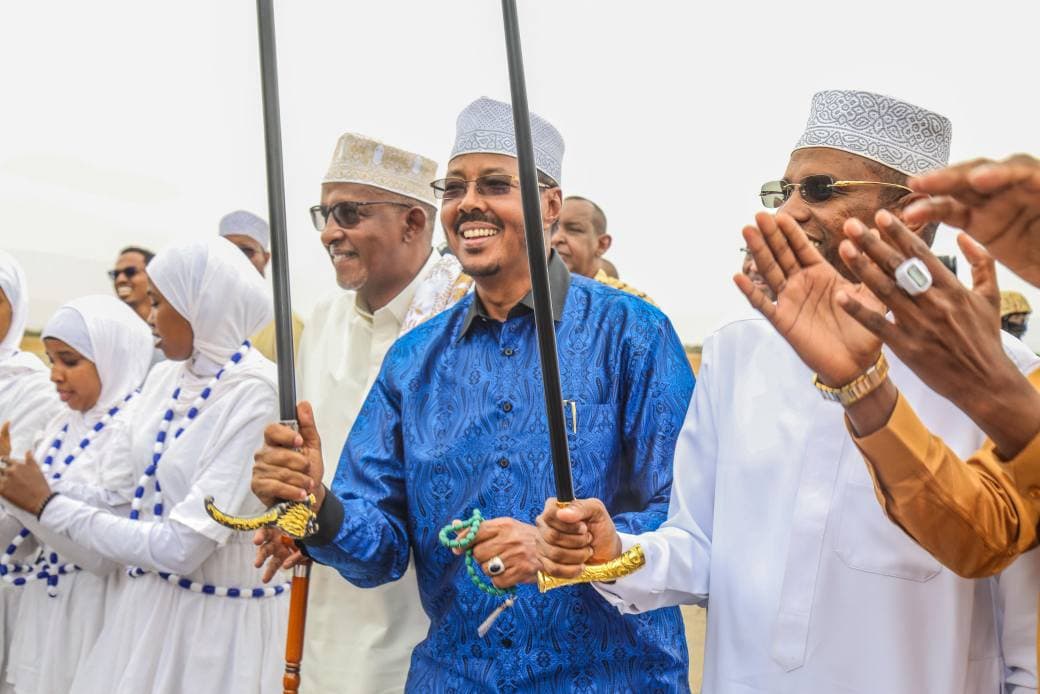We're loading the full news article for you. This includes the article content, images, author information, and related articles.
Cabinet Secretary Aden Duale has declared that the Muslim and Northeastern communities will reward President William Ruto at the 2027 ballot, citing the removal of discriminatory ID vetting policies as a key factor in a significant political realignment.

Cabinet Secretary Aden Duale has announced that the Northeastern region and the broader Muslim community in Kenya will deliver their votes to President William Ruto in the 2027 general election as a “payback” for what he termed the restoration of their dignity. Speaking in Wajir town on Sunday, November 16, 2025, during the coronation of Sultan Abdirahman Sultan Hussein, Duale anchored his declaration on the President’s February 2025 directive to abolish the decades-old, discriminatory vetting process for residents of border counties seeking national identity cards.
“Your administration is the first one that has listened to the cries of our people and acted decisively,” Duale stated, addressing the President. “You brought back our dignity to the people of North Eastern Kenya, the wider Muslim community, and all Kenyans by ending a discriminatory system that made us feel like second-class citizens.”
The policy shift ended a 60-year-old practice, stemming from the Shifta War of the 1960s, which required residents of Garissa, Wajir, Mandera, and other border areas to undergo additional scrutiny to acquire national IDs. This often led to long delays and accusations of ethnic and religious profiling, effectively disenfranchising many citizens who could not access education, formal employment, or financial services without the crucial document.
The impact of this policy change has been tangible. In September 2025, Interior Cabinet Secretary Kipchumba Murkomen confirmed that the reforms were transforming lives, with ID cards now being issued within three to seven days of registration in the region—a process that previously took months or even years. During a security forum in Wajir, hundreds of students received their IDs just one week after applying, an event hailed by local leaders as unprecedented since independence.
Duale’s pledge signals a significant potential shift in the political landscape of Northeastern Kenya, a region that has historically voted overwhelmingly for the opposition. An analysis of the 2022 presidential election results from the Independent Electoral and Boundaries Commission (IEBC) underscores the magnitude of this proposed realignment. In Garissa County, Raila Odinga garnered 75,870 votes against William Ruto’s 19,718. The gap was even wider in Mandera County, where Odinga received 106,256 votes to Ruto’s 28,349. In Wajir County, Odinga secured 82,825 votes while Ruto received 48,438.
Accompanied by a host of regional leaders, including Eldas MP Adan Keynan, Duale urged residents to register as voters in large numbers to solidify the region's political influence. “It is for this reason that we are telling our people to register en masse so that we can pay back for the dignity you brought back to our communities,” he added.
Beyond the ID vetting issue, the Kenya Kwanza administration has initiated several large-scale development projects in the historically marginalized region, which leaders are leveraging as proof of the government's commitment. A central project is the 750-kilometer Isiolo-Mandera highway, a Sh100 billion initiative expected to drastically cut travel times, improve security, and boost trade with Somalia and Ethiopia. Deputy President Kithure Kindiki, during an inspection in August 2025, described the highway as a “game changer” that will integrate the region into the national economy. Eldas MP Adan Keynan lauded the project as a sign of the government's push for equitable transformation.
Other key projects include the Affordable Housing Programme, with 220 units under construction in Wajir, a project that commenced in November 2023 and is slated for completion. In Garissa, a stalled police housing project with 150 units was revived in November 2025 under the same programme. Furthermore, the government has allocated billions towards rural electrification, with Sh2.8 billion invested in Mandera County, including a nearly complete hybrid power plant in Elwak.
Despite the government's development push, challenges remain. Some projects have faced delays and criticism. In Mandera, residents have previously voiced concerns over inequitable budget allocations and the slow pace of infrastructure development, particularly roads and water projects. The affordable housing projects across the northern frontier have also run into legal and procedural hurdles related to the acquisition of community land, with some analysts warning that a failure to follow the Community Land Act could lead to disputes and project paralysis.
While leaders like Duale are championing the administration's successes, there has been a notable silence from national opposition figures and major Muslim organizations like the Supreme Council of Kenya Muslims (SUPKEM) in response to the endorsement. SUPKEM has recently been focused on internal leadership wrangles and has commented on broader national issues of governance but has not issued a specific statement on the 2027 political alignment. This lack of a unified response from national Muslim leadership suggests that while the government's actions are celebrated by some, a monolithic political bloc is not yet guaranteed. Further investigation is required to ascertain the broader sentiment within the community across the country.
Keep the conversation in one place—threads here stay linked to the story and in the forums.
Sign in to start a discussion
Start a conversation about this story and keep it linked here.
Other hot threads
E-sports and Gaming Community in Kenya
Active 9 months ago
The Role of Technology in Modern Agriculture (AgriTech)
Active 9 months ago
Popular Recreational Activities Across Counties
Active 9 months ago
Investing in Youth Sports Development Programs
Active 9 months ago
Key figures and persons of interest featured in this article